We hear the word "accountability" thrown around a lot, but what does it actually look like at work?
Research shows that teams with a strong sense of accountability can see productivity jump by as much as 50%. [1]
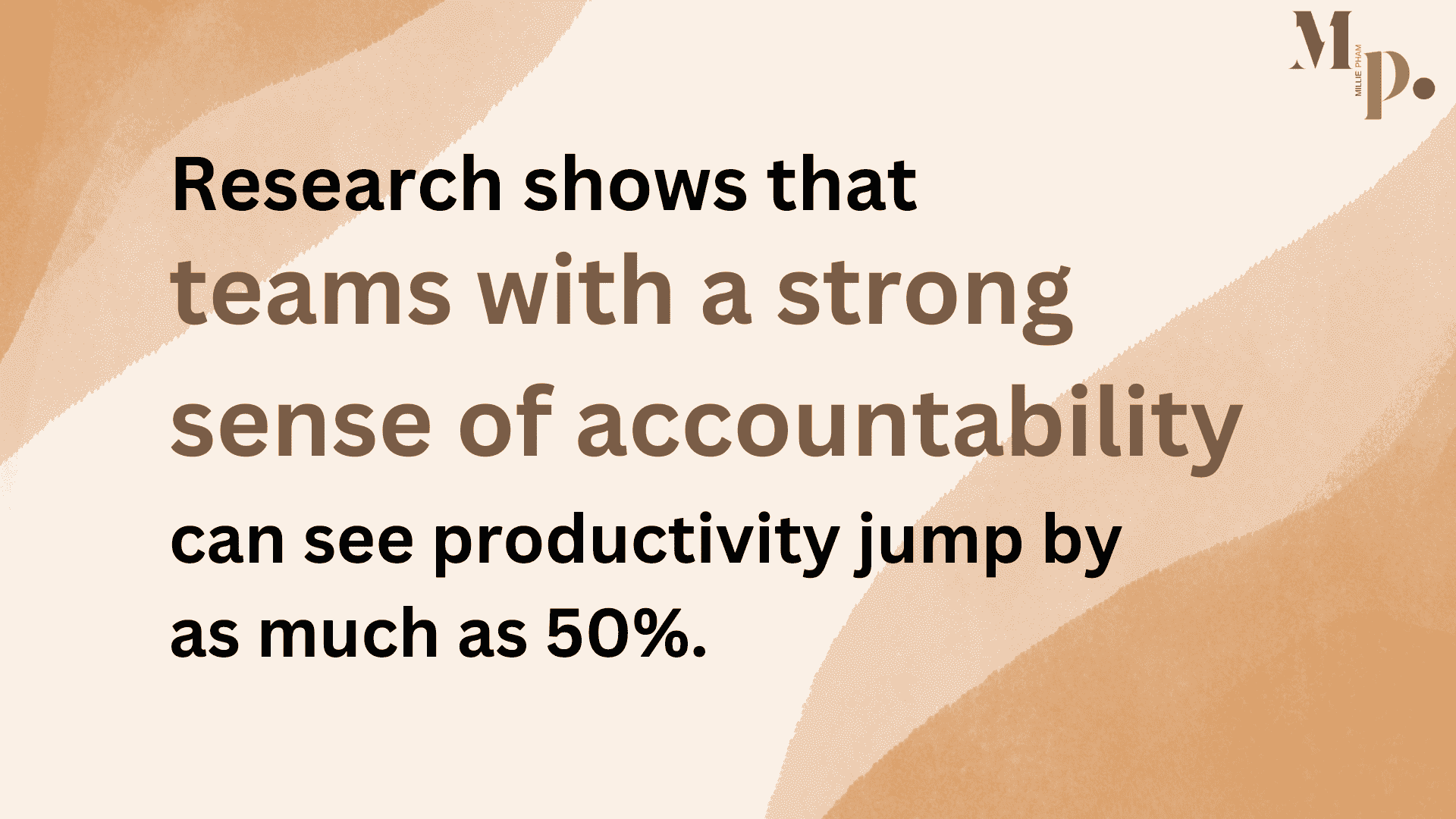
But how do you put this into practice and spot it in everyday situations?
In this article, we’ll break down 21 real-world examples of accountability in the workplace whether in-office or remote work in a virtual office, to help you and your team take ownership, communicate better, and build a culture of trust.
Ready to see how it’s done? Let’s get into it.
What is Accountability in the Workplace?
Accountability in the workplace means taking ownership of your actions, tasks, and decisions. It’s about being reliable and doing what you say you will, even when no one is watching.
This creates trust among team members because everyone knows they can count on each other. When you’re accountable, you don’t blame others when things go wrong.
Instead, you look at what you could have done differently and take steps to make it right.
Now, let’s clear up something important: accountability is not the same as responsibility. Responsibility is about being given a task or role—it's what you’re expected to do.
Accountability, on the other hand, is about actually following through and being answerable for the results.
Why Accountability Matters in the Workplace

Accountability is important because it builds trust and helps everyone rely on each other. When people keep their promises and do what they say, working together becomes easier and more enjoyable.
According to a Deloitte study, 86% of employees and 74% of leaders believe that being honest and trustworthy is key to a company’s success. [2]
When you take responsibility for your tasks, you feel more connected and proud of your work, which makes the job feel more meaningful.
It also reduces stress since everyone knows who’s handling what, and there's less chance for confusion.
In the end, accountability makes work a happier place where people feel respected and want to do their best.
21 Real-Life Examples of Accountability in the Workplace
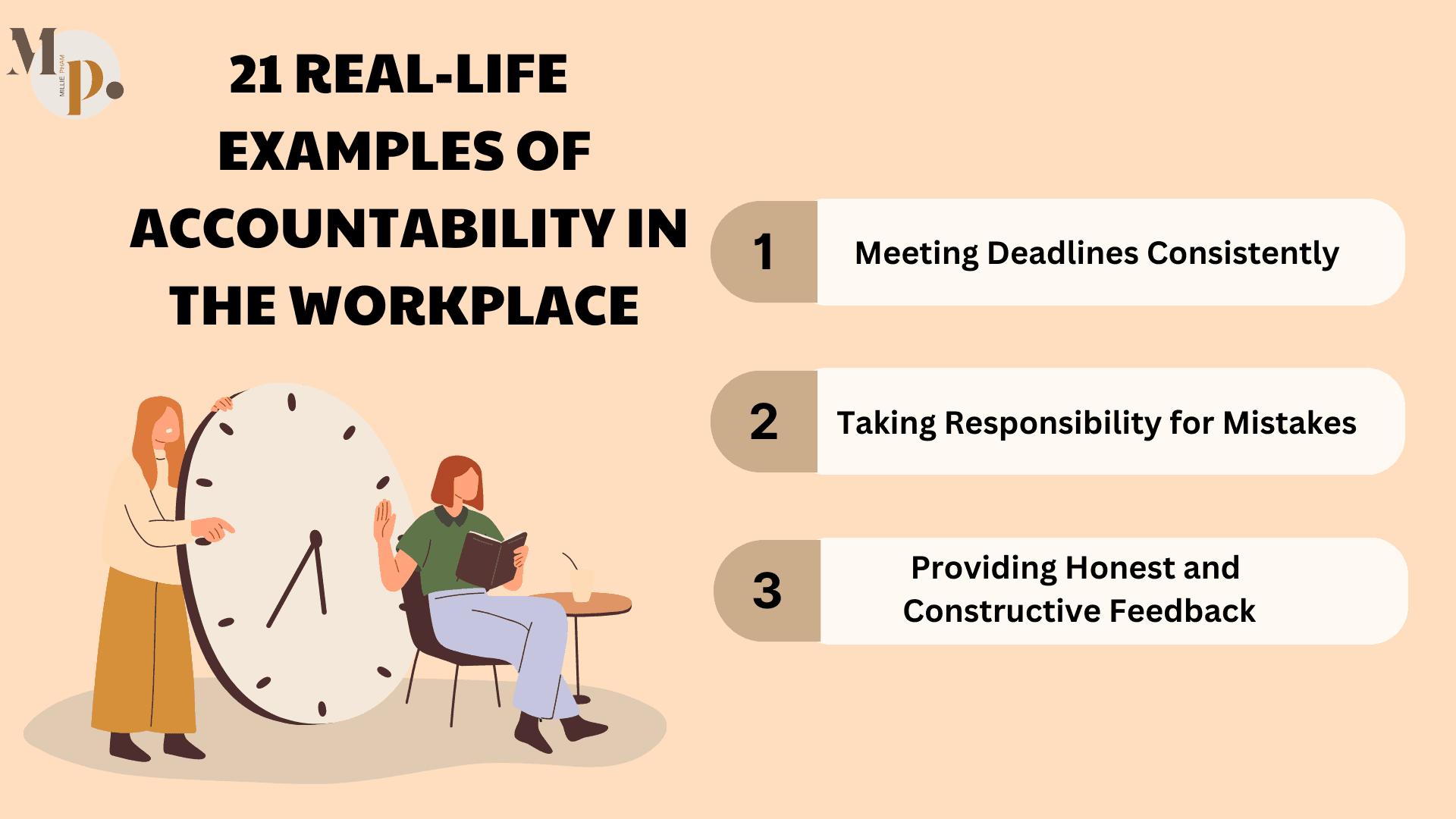
Example 1: Meeting Deadlines Consistently
Meeting deadlines shows that you’re dependable and serious about your work. It tells your team they can trust you to get things done on time, which builds a lot of respect.
When you consistently deliver on time, people see that you’re committed and accountable.
But let’s be real—sticking to deadlines isn’t always easy. Here are some tips to help you manage them better:
- Break it Down: Divide your task into smaller steps. It’s easier to manage little pieces than to tackle one big project all at once.
- Set Clear Priorities: Focus on the most important tasks first. This way, you’re always working on what matters most.
- Use a Calendar or Planner: Write down your deadlines, and set reminders a few days ahead. This helps you avoid any last-minute rush.
- Avoid Multitasking: Trying to do too many things at once can slow you down. Stick to one task at a time for better focus.
- Ask for Help When Needed: If you’re struggling, reach out before the deadline. It’s better to ask for support than to miss it altogether.
Real-life scenario
Imagine you’re working on a marketing campaign, and your part is to create social media posts. You finish the posts a day before the deadline, giving your manager enough time to review and approve them.
This ensures the campaign launches on schedule, and your team sees you as reliable.
Example 2: Taking Responsibility for Mistakes
Owning up to your mistakes shows that you’re honest and willing to learn, which builds trust with others.
When you admit an error, it shows that you care about getting things right and that you're ready to fix the problem. This kind of accountability helps others see you as reliable, even when things don’t go as planned.
To create a work environment where people feel safe admitting their mistakes, try these tips:
- Create Open Communication: Encourage people to speak up about challenges before they become bigger issues. This makes it easier to address problems early on.
- Lead by Example: When leaders admit their own mistakes, it encourages everyone else to do the same. It shows that it's okay to be human.
- Focus on Solutions, Not Blame: Instead of pointing fingers, ask, “What can we do to fix this?” This helps everyone focus on learning and moving forward.
- Celebrate Lessons Learned: When someone admits a mistake and learns from it, recognize their courage. This helps others feel safer about being honest.
Real-life scenario
Suppose you sent an email to the wrong client with sensitive information. Instead of hiding it, you immediately inform your manager, apologize to the client, and work on correcting the mistake. Your honesty and quick action demonstrate accountability.
Example 3: Providing Honest and Constructive Feedback
Open communication is key to building accountability in any team. When we share honest feedback, we help each other see where and how to improve. This creates a culture where people feel comfortable talking about what's working and what isn't, which helps everyone stay accountable for their actions.
But giving and receiving feedback isn’t always easy. Here’s how to do it respectfully:
- Listen Carefully: When you’re on the receiving end, take a moment to really listen. Ask questions if you’re unsure, and don’t jump to defend yourself immediately.
- Be Clear and Specific: Instead of saying, "You’re not doing a good job," try something like, "I noticed the report was missing some details. Let’s include them next time."
- Focus on the Action, Not the Person: Talk about the behavior or task, not the individual. This keeps things professional and less personal.
- Use “I” Statements: Start with “I noticed” or “I feel” to make the feedback feel less like a blame game and more like an observation.
Real-life scenario
Suppose you sent an email to the wrong client with sensitive information. Instead of hiding it, you immediately inform your manager, apologize to the client, and work on correcting the mistake. Your honesty and quick action demonstrate accountability.
Example 4: Showing Up Prepared for Meetings
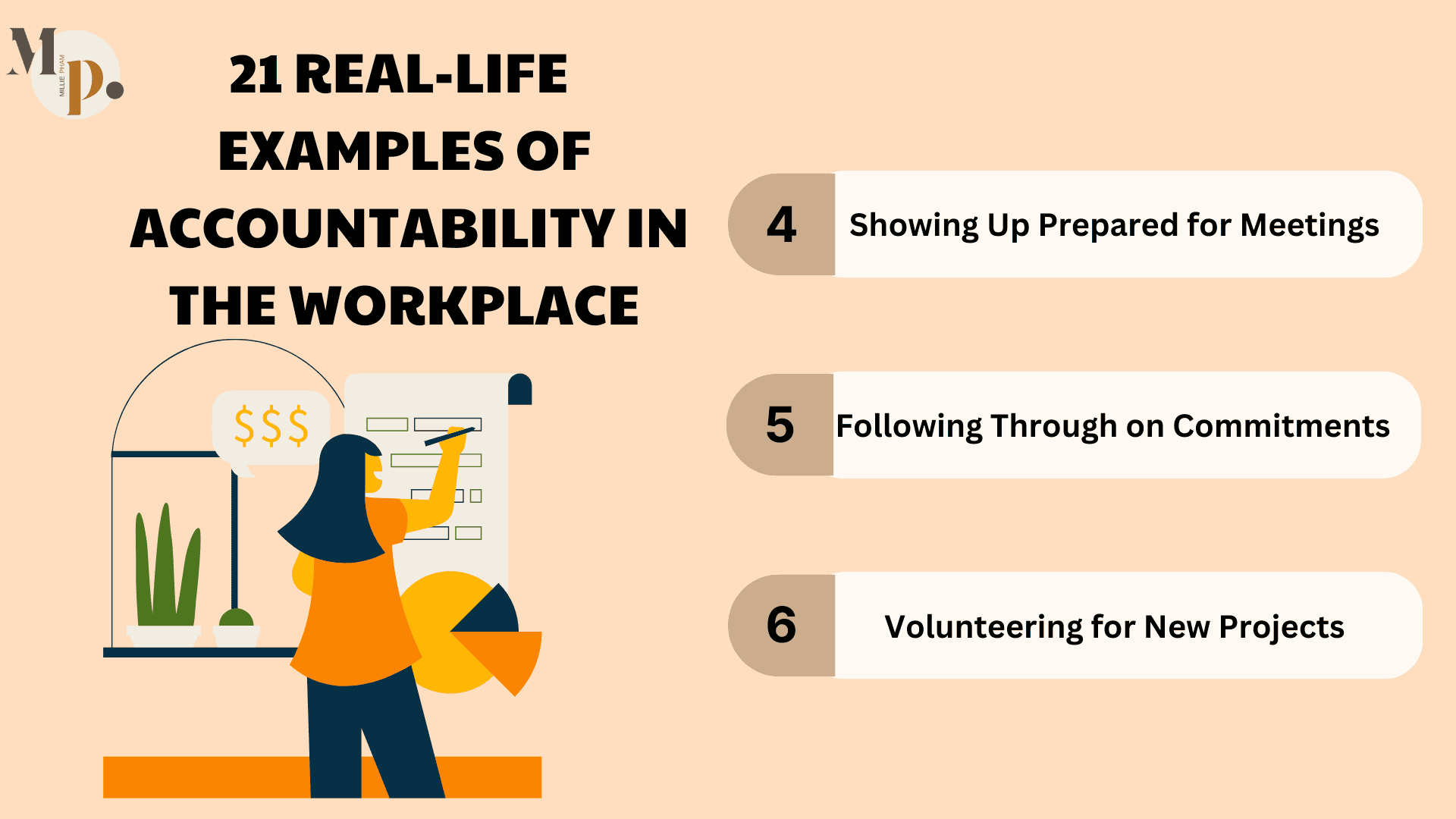
When you show up prepared for meetings, it tells everyone that you respect their time and take your role seriously.
It shows that you’re accountable and ready to contribute, making the whole meeting more productive and efficient.
Being prepared means you’ve taken the time to understand the agenda, gather your thoughts, and bring any materials you might need. This helps you speak up confidently and stay engaged.
To stay organized and ready for discussions, try these simple tips:
- Be On Time: Arriving a few minutes early gives you time to settle in and review your notes one last time.
- Review the Agenda Ahead of Time: If there’s an agenda, read through it before the meeting so you know what to expect and can prepare any questions or ideas.
- Take Notes: Jot down important points or questions you want to discuss. This helps you stay focused and ensures you don’t forget anything during the meeting.
- Bring Necessary Documents: Whether it’s a report, spreadsheet, or presentation, have all the materials you might need at your fingertips.
Real-life scenario
You’re attending a project update meeting, and you’ve reviewed all the documents beforehand. As a result, you’re able to provide meaningful input and ask relevant questions, showing your team that you’re engaged and committed.
Example 5: Following Through on Commitments
When you follow through on your commitments, it shows your team that you’re dependable and trustworthy. This reliability lifts team morale because everyone knows they can count on each other to get things done. It builds a sense of security and trust, making it easier for everyone to work together and feel confident that goals will be met.
To make sure you keep your promises, try these strategies:
- Communicate If There’s an Issue: If something comes up and you can’t deliver, let others know as soon as possible. This shows that you’re still taking responsibility and allows others to adjust.
- Don’t Overcommit: Be honest about what you can handle. It’s better to say no upfront than to make a promise you can’t keep.
- Write It Down: Keep a list of your commitments and deadlines. This helps you remember what you’ve agreed to and makes it easier to stay on track.
- Prioritize Tasks: Focus on the most important commitments first, so you’re not scrambling at the last minute.
Real-life scenario
You promised to research and present a new software tool that could improve team efficiency. Despite a busy schedule, you deliver a detailed presentation on time, demonstrating that you keep your word.
Example 6: Volunteering for New Projects
Volunteering for new projects shows you’re ready to take charge and be accountable. It’s not just about doing extra work; it’s about showing that you care about the team’s success and are willing to pitch in where needed.
This kind of initiative builds trust because it shows others they can rely on you, even for tasks outside your usual role.
To encourage this proactive mindset in the team, start by recognizing and appreciating those who step up. It makes people feel valued and more willing to contribute.
Also, make it clear that it’s okay to try new things, even if they’re not perfect. When everyone feels comfortable taking the lead, the whole team becomes more responsible and engaged.
Real-life scenario
Your manager mentions a new project that requires someone to organize data. Even though it’s not part of your usual duties, you volunteer, showcasing your willingness to take on challenges and support the team.
Example 7: Actively Listening and Responding
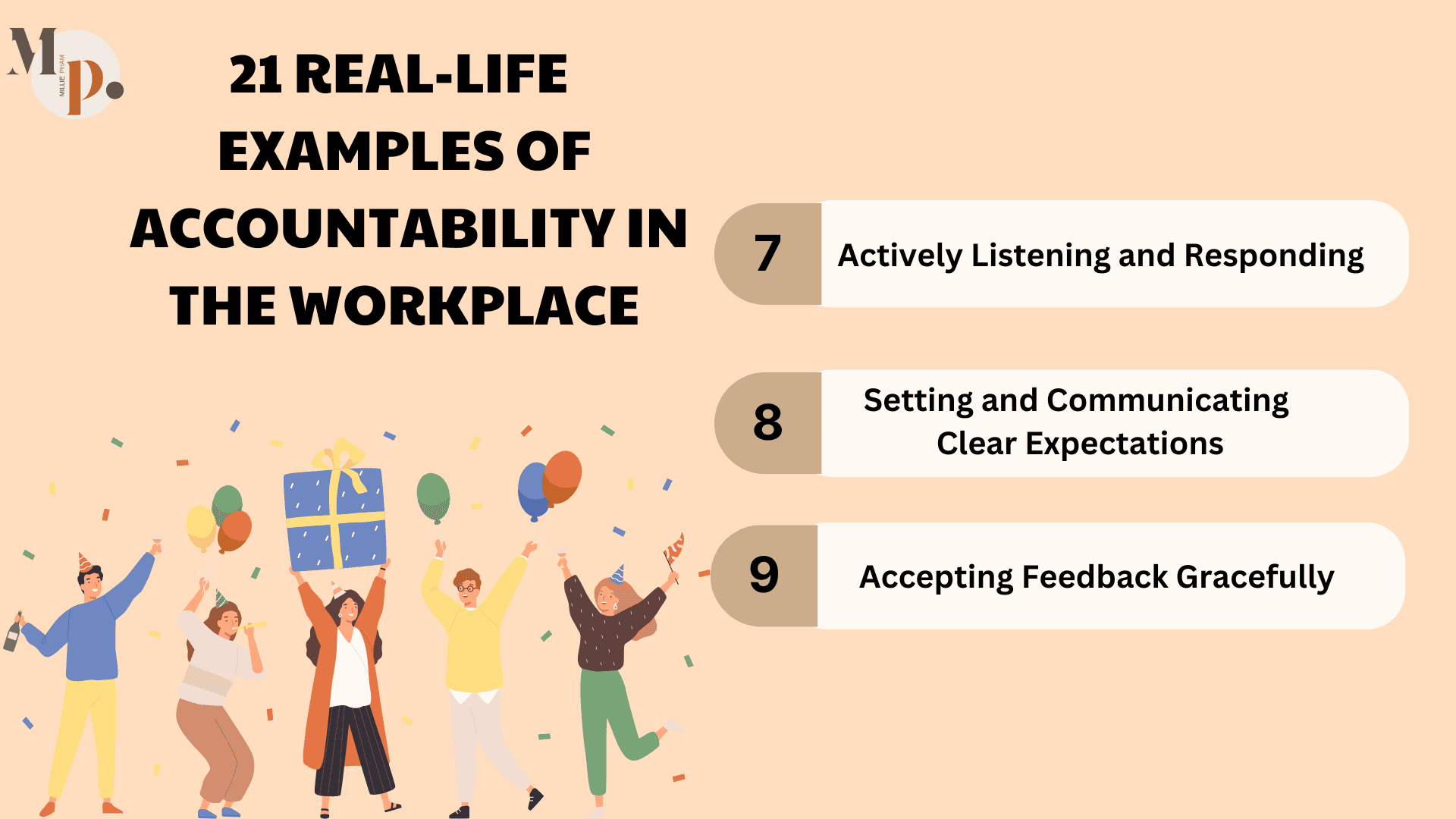
Actively listening to others is a key part of being accountable. It shows that you value their thoughts and are willing to understand their point of view.
When you really listen, you’re more likely to respond thoughtfully and avoid misunderstandings, which helps build trust and strong working relationships.
To get better at active listening, try these simple techniques:
- Stay Focused: Put away distractions like your phone and give the speaker your full attention. It shows you respect their time.
- Make Eye Contact: This helps the other person feel heard and encourages you to stay engaged in the conversation.
- Ask Questions: If something isn’t clear, ask for more details. It shows that you’re genuinely interested and want to understand.
- Repeat Back What You Heard: Summarizing or paraphrasing what the other person said ensures you got the message right and shows that you’re paying attention.
By practicing these habits, you’ll not only improve your listening skills but also show your team that you’re committed to understanding and supporting them. This kind of accountability makes a big difference in creating a positive and respectful work environment.
Real-life scenario
In a team meeting, a colleague shares an idea, and you listen without interrupting, then say, "That's a great point. How can we make it work?" This shows you respect their input and are engaged in finding solutions together.
Example 8: Setting and Communicating Clear Expectations
Setting clear expectations is one of the best ways to drive accountability in a team.
When everyone knows exactly what’s expected of them, there’s less room for confusion or missed deadlines.
Clarity helps each person take ownership of their role because they understand what needs to be done and why it matters.
To set achievable goals, start by being specific. Instead of saying, “Finish the project soon,” say, “Complete the report by Friday afternoon.”
This way, everyone knows what’s expected and by when. Also, make sure to check in regularly to see if anyone needs help or if priorities have changed.
Lastly, always encourage open communication—ask questions and invite feedback to make sure everyone’s on the same page.
When goals are clear and understood, accountability naturally follows, and the team can work more smoothly together.
Real-life scenario
You’re leading a project and set specific deadlines and deliverables for each team member from the beginning. As a result, everyone knows their responsibilities, reducing misunderstandings and improving productivity.
Example 9: Accepting Feedback Gracefully
Being open to feedback shows that you’re accountable and willing to improve. It means you care about getting better instead of just proving you’re right. When you accept constructive criticism, it shows others that you’re committed to your growth and that you respect their opinions.
To handle feedback without getting defensive, try these steps:
- Listen Carefully: Let the person finish without interrupting. This shows that you’re truly open to what they’re saying.
- Take a Moment: If the feedback stings a bit, take a deep breath before responding. It’s okay to pause and process.
- Ask Questions: If you’re unsure about something, ask for examples. This helps you understand the feedback better and shows you’re interested in improving.
- Thank Them: Appreciate that someone took the time to share their thoughts. It takes courage to give honest feedback, and saying "thank you" goes a long way.
By accepting feedback gracefully, you show that you’re serious about being accountable and growing, which earns respect from others and helps you keep improving.
Real-life scenario
Your manager points out that your reports could be more detailed. Instead of getting defensive, you thank them for the feedback and use it to enhance your future reports, showing your commitment to growth.
Example 10: Sharing Credit for Success
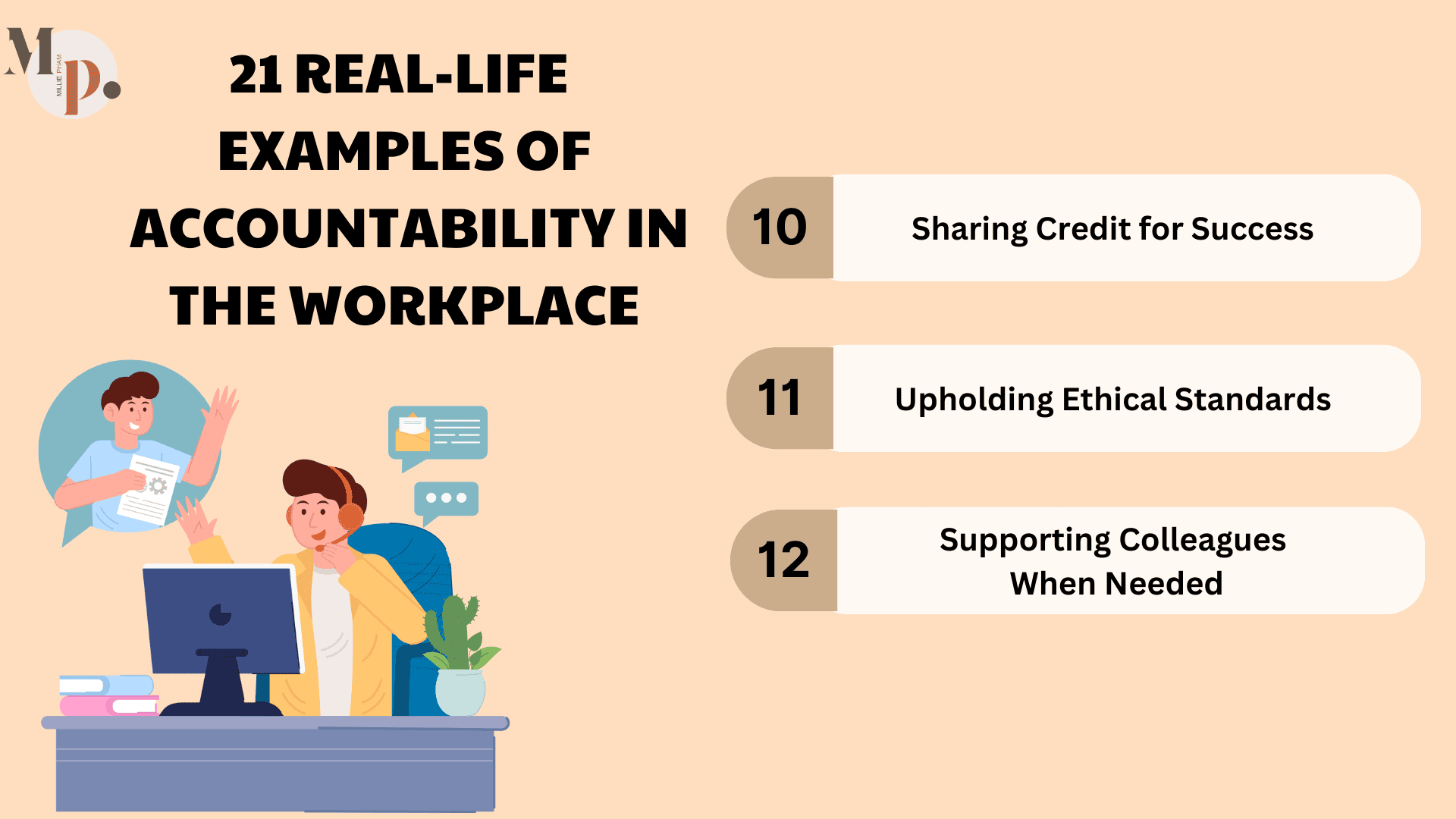
Sharing credit when things go well shows that you value your team and recognize everyone’s efforts.
It’s a simple but powerful way to foster a culture of accountability, where people feel appreciated for their contributions.
When you highlight the team’s work instead of just focusing on your own, you show that success isn’t just about one person—it’s about what everyone achieved together.
To encourage this mindset, make it a habit to celebrate collective wins. When a project goes well, mention how different team members contributed.
Use phrases like, “We couldn’t have done this without…” or “Thanks to everyone who helped…”
This kind of recognition boosts team morale and encourages everyone to stay accountable, knowing that their hard work will be noticed and appreciated.
It turns individual achievements into shared victories, making the team stronger and more connected.
Real-life scenario
After a successful project, you make sure to mention the contributions of each team member during a meeting. This not only boosts morale but also reinforces the idea that accountability and success are shared.
Example 11: Upholding Ethical Standards
Upholding ethical standards means doing the right thing, even when no one is watching.
It’s about being honest, fair, and respectful in everything you do. This shows that you’re not just accountable to your boss or team, but to yourself.
When you stick to ethical practices, you build trust with others, making it easier for everyone to feel confident and work together.
To make this a habit, always be clear about your values and stick to them, even when it’s tough.
If you see something that doesn’t feel right, speak up or address it respectfully.
By staying true to ethical standards, you set a strong example for others and help create a workplace where accountability and integrity are a priority.
Real-life scenario
You discover an error in the financial report that nobody else has noticed. Instead of ignoring it, you bring it to your manager's attention, demonstrating your commitment to honesty and ethical behavior.
Example 12: Supporting Colleagues When Needed
Supporting your colleagues shows that you’re not just focused on your own tasks but care about the team’s success.
It’s a big part of being accountable because when you step in to help, you show that you’re reliable and committed to the team’s goals.
It’s not just about doing your job—it’s about making sure everyone can do theirs, too.
Here are some tips for creating a supportive work environment:
- Celebrate others’ successes: Recognize and acknowledge your colleagues’ achievements to build a positive and encouraging atmosphere.
- Be approachable: Let your colleagues know they can come to you if they need help or advice.
- Offer help without being asked: If you notice someone struggling, step in and see how you can assist.
- Share knowledge and resources: If you have information that could help others, don’t keep it to yourself.
- Check in regularly: Ask your teammates how they’re doing and if they need any support with their tasks.
Real-life scenario
A colleague is struggling with a tight deadline, so you offer to help with part of their work. This act of support shows that you’re committed to the team’s overall goals, not just your own.
Example 13: Managing Time Effectively
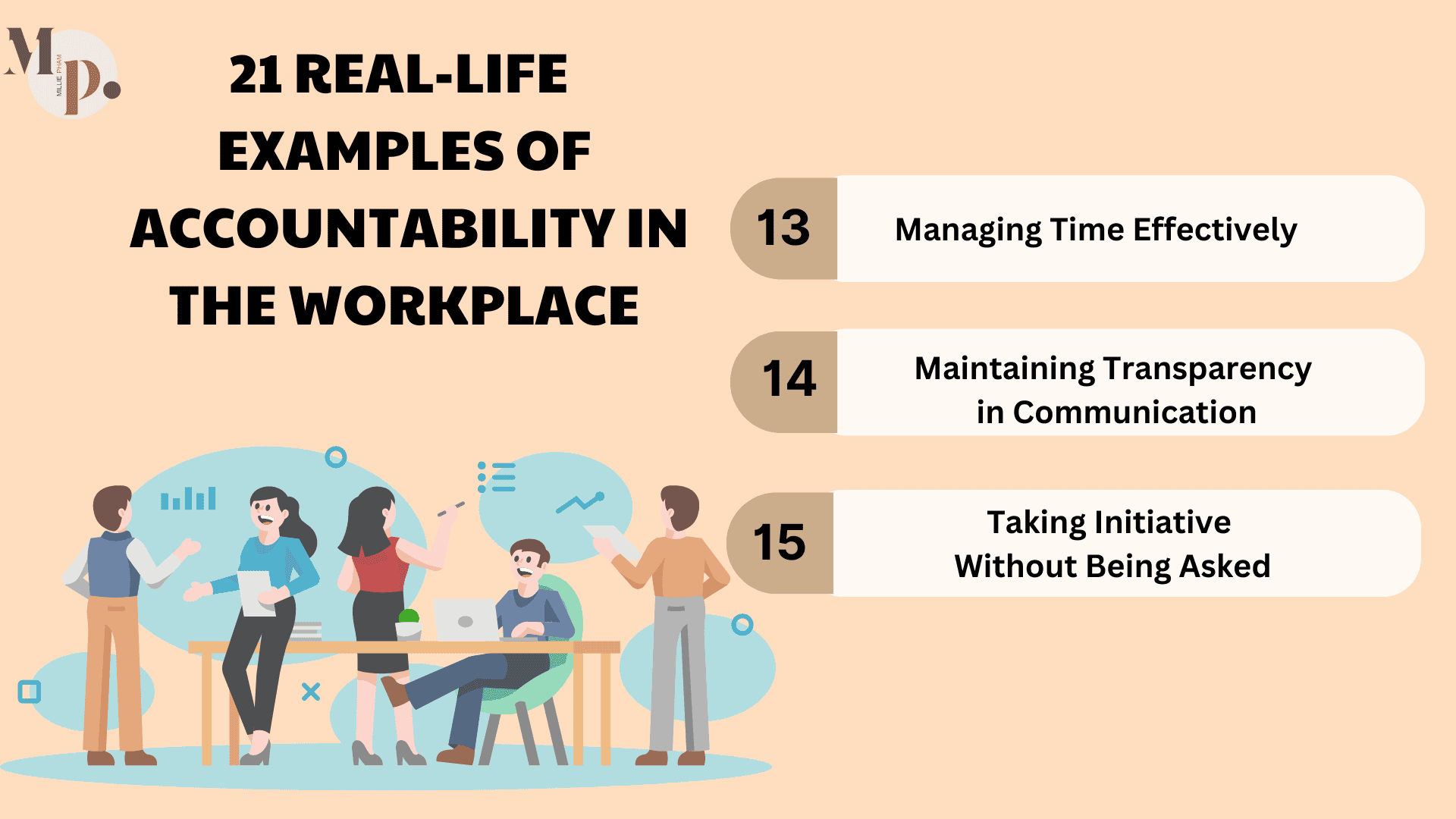
Managing your time well is a big part of being accountable. When you use your time wisely, you show that you’re serious about meeting your goals and responsibilities. It helps you stay on top of tasks, meet deadlines, and be more reliable, which makes others see you as someone they can count on.
Here are some tools and techniques to help manage your time better:
- Take Breaks: Short breaks can actually help you stay more focused and productive throughout the day.
- Use a To-Do List: Write down your tasks for the day. It’s a simple way to keep track of what needs to be done.
- Prioritize: Focus on the most important tasks first. Tackle high-priority items before moving to smaller ones.
- Set Time Blocks: Dedicate specific blocks of time to each task. This keeps you focused and helps avoid distractions.
- Use Time Management Apps: Apps like Trello, Motion (My review here), Asana, or Google Calendar can help you plan and organize your work.
Real-life scenario
You prioritize your tasks by using a daily to-do list and finish all your assignments without needing to stay late. This efficiency demonstrates your dedication to time management and accountability.
Example 14: Maintaining Transparency in Communication
Being honest and clear in your communication builds trust and shows that you’re accountable.
When people know you’re upfront and not hiding anything, they feel more comfortable working with you. This honesty makes it easier to solve problems, avoid misunderstandings, and work together as a team.
Here are some examples of transparent communication in teams:
- Clear Goals and Expectations: Make sure everyone knows what’s expected from the start. This helps avoid confusion and keeps everyone on the same page.
- Sharing Project Updates: Keep everyone in the loop about how a project is going, even if there are delays or challenges. It shows you’re taking responsibility and helps the team adjust.
- Admitting Mistakes: If something goes wrong, let your team know right away and discuss how to fix it. This shows you’re accountable and willing to learn.
Real-life scenario
You’re running behind on a project, so you inform your manager in advance and provide a realistic timeline. This transparency helps manage expectations and maintains trust.
Example 15: Taking Initiative Without Being Asked
Taking initiative means stepping up and doing what needs to be done without waiting for someone to tell you.
This shows true accountability because it proves you’re willing to go above and beyond to help the team succeed. It shows that you care about the bigger picture and are ready to take responsibility, even if it’s not part of your official job.
Here’s how you can encourage self-motivation in the workplace:
- Lead by Example: Show your team how you take initiative yourself. When they see you doing it, they’ll feel more inspired to do the same.
- Recognize Efforts: When someone takes initiative, acknowledge it. A simple “Thank you for jumping in” can make a big difference.
- Create a Safe Space for Ideas: Let team members share their suggestions and ideas without fear of judgment. This encourages them to step up more often.
- Provide Opportunities for Growth: Give people the chance to take on new challenges or projects, so they feel empowered to show initiative.
Real-life scenario
You notice that the office supply cabinet is running low, so you order more before it becomes an issue, showing that you care about the team’s needs.
Example 16: Holding Others Accountable Respectfully
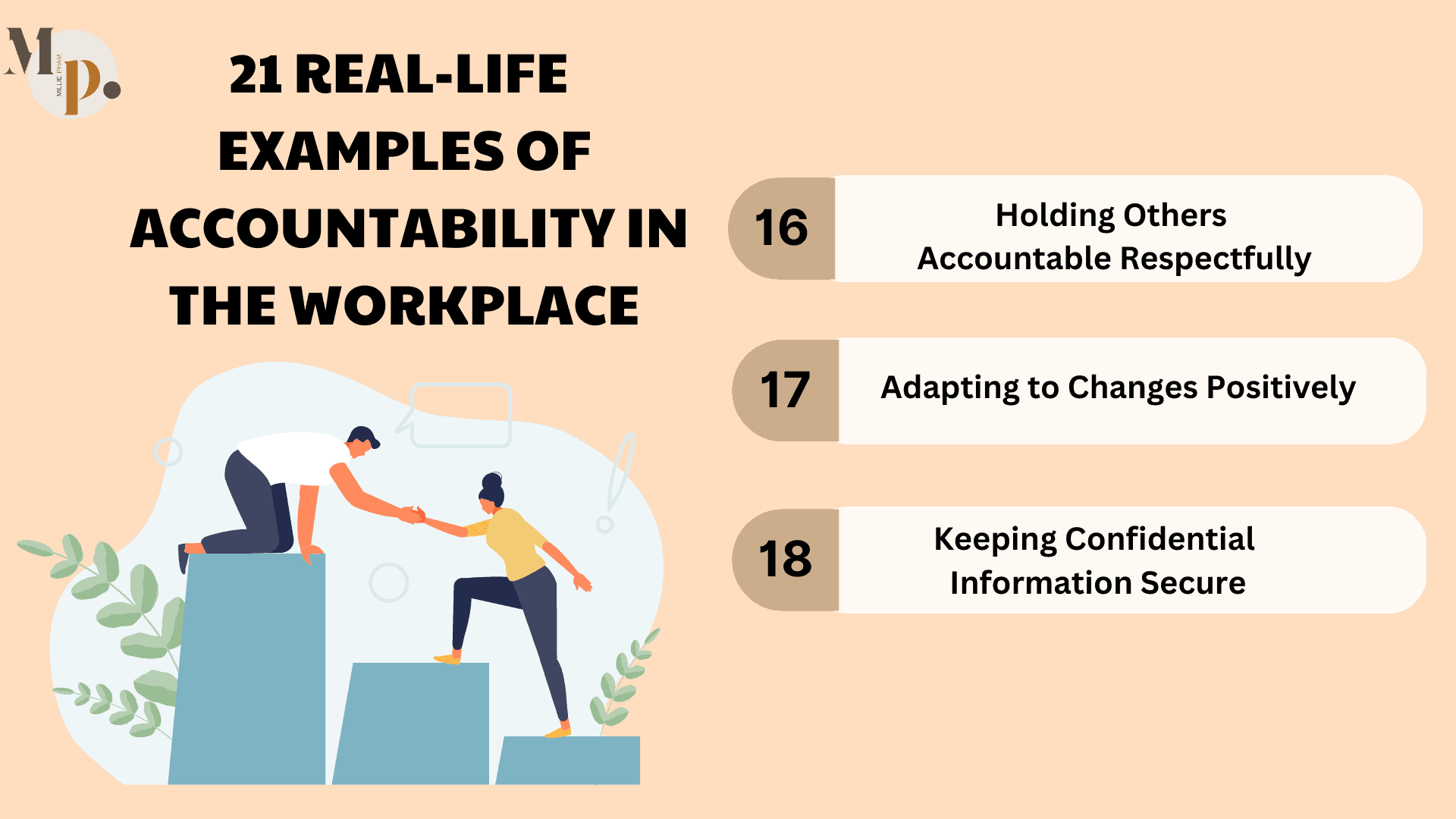
Holding others accountable is important, but it needs to be done respectfully to keep a positive work environment. Addressing accountability issues with peers in a constructive way shows that you care about the team’s success, not just pointing out faults. It’s about helping each other grow and stay on track.
Here are some approaches for peer-to-peer accountability:
- Be Open to Feedback Yourself: Encourage your peers to hold you accountable too. It creates a sense of fairness and makes the process feel more like a team effort.
- Use “I” Statements: Instead of saying, “You didn’t do this,” try, “I noticed this task wasn’t finished.” This makes it less about blaming and more about working together.
- Focus on the Solution: Discuss how you can fix the problem together rather than just highlighting what went wrong.
- Choose the Right Time and Place: Talk to your peer in private and at a time when they can focus. This shows respect and avoids embarrassmen
Real-life scenario
A teammate missed a deadline, impacting the project’s progress. You approach them privately, ask if they need any help, and remind them of the importance of meeting future deadlines, showing respect and concern for their success.
Example 17: Adapting to Changes Positively
Adapting to change is a big part of being accountable because it shows you’re willing to adjust and keep moving forward, even when things don’t go as planned.
Embracing change positively helps you stay on track, no matter what challenges come your way, and it sets a good example for your team.
Here are some tips for staying flexible in a dynamic work environment:
- Learn From Mistakes: Change often brings unexpected bumps. Instead of getting discouraged, treat them as learning opportunities and adapt accordingly.
- Stay Open-Minded: Instead of resisting new ideas, try to see the benefits they might bring. Ask yourself, “How can this change help us improve?”
- Break It Down: If a big change feels overwhelming, focus on one small step at a time. This makes it easier to adjust without feeling stressed.
- Communicate Clearly: Keep your team updated on changes and be honest about how they might affect your work. This helps everyone stay on the same page.
Real-life scenario
Your company switches to a new project management software. Instead of complaining, you take the time to learn how it works and even offer to help others get familiar with it. This adaptability demonstrates your commitment to team success.
Example 18: Keeping Confidential Information Secure
Keeping confidential information secure is a key part of being accountable, as it shows that you respect and protect sensitive data, whether it’s about clients, employees, or the company.
When you handle this information carefully, you build trust and show that you take your responsibilities seriously.
Here are some simple practices to ensure data protection and privacy:
- Limit Access: Only share confidential information with those who truly need it for their work.
- Use Strong Passwords: Create unique, complex passwords and change them regularly. Avoid using the same password for multiple accounts.
- Be Cautious with Emails: Don’t open attachments or click on links from unknown senders, as they could contain malware. Always double-check before sharing sensitive information over email.
- Lock Your Devices: Make sure your computer and phone are locked when you’re not using them, especially if you’re in a shared or public space.
- Use Encryption Tools: Whenever possible, use encryption to protect sensitive files and data. This ensures that only authorized people can access the information.
Real-life scenario
You receive access to confidential financial reports. Instead of sharing them over email, you use a secure, password-protected platform to ensure the information stays private, showing your dedication to protecting sensitive data.
Example 19: Seeking Solutions Instead of Blaming
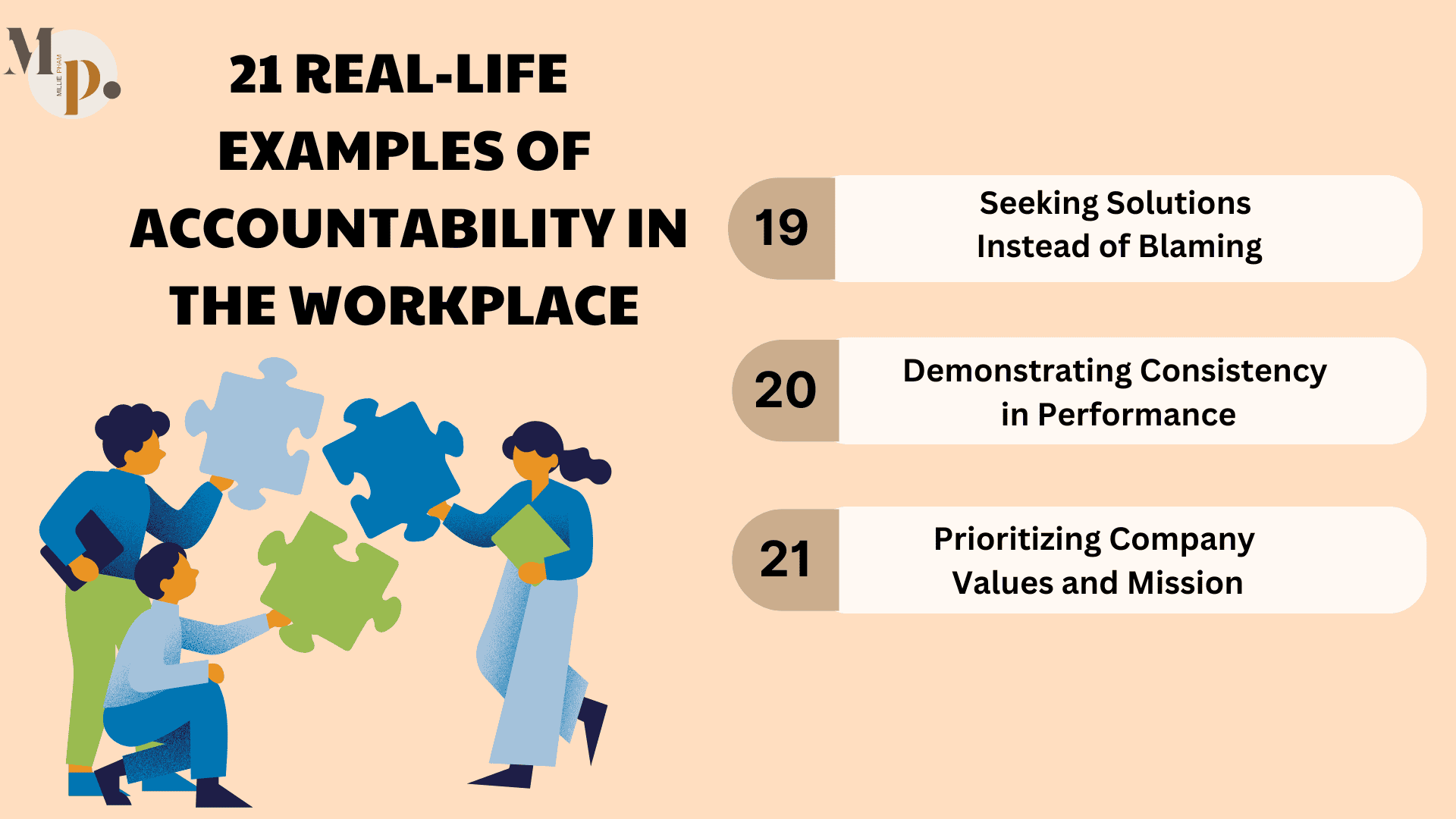
When you focus on finding solutions instead of blaming others, it shows that you’re accountable and willing to fix problems.
This kind of problem-solving attitude helps the team move forward quickly without wasting time pointing fingers.
It shows that you care about getting things done and improving the situation, which builds trust and respect.
To foster a solution-oriented mindset, try these techniques:
- Learn from Mistakes: Instead of getting stuck on what went wrong, look at what can be learned to avoid the same issue in the future.
- Stay Calm: When a problem arises, take a deep breath and focus on the issue, not who’s at fault. This helps you think more clearly.
- Ask “What Can We Do Next?”: Shift the focus to action by asking what steps can be taken to fix the problem.
- Encourage Team Input: Invite others to share their ideas and suggestions. Sometimes, the best solutions come from teamwork.
Real-life scenario
During a project review, you find that a key task wasn’t completed, causing a delay. Instead of blaming your teammate, you suggest ways to catch up and offer assistance, demonstrating your focus on solutions and team success.
Example 20: Demonstrating Consistency in Performance
Being consistent in your work shows that you’re accountable and reliable. When you deliver quality results every time, people know they can count on you, and this builds trust within the team.
It means you’re not just doing a good job once or twice—you’re committed to maintaining high standards, no matter what.
To keep your work output consistent, try these simple habits:
- Stay Committed: Even on tough days, keep pushing yourself to do your best. Consistency isn’t about being perfect; it’s about showing up and giving your best effort every time.
- Create a Routine: Stick to a daily routine that helps you stay organized and focused. This makes it easier to deliver steady results.
- Set Clear Goals: Know exactly what’s expected of you, and keep these goals in mind as you work. It helps you stay on track and meet high standards.
- Double-Check Your Work: Before finishing any task, take a moment to review it. This extra step helps you catch mistakes and ensure quality.
Real-life scenario
Your weekly reports are always thorough, accurate, and submitted on time. Your manager and colleagues know they can rely on you, which helps maintain a smooth workflow.
Example 21: Prioritizing Company Values and Mission
When you align your personal goals with the company’s values and mission, it shows that you’re not just doing a job—you’re genuinely invested in the bigger picture.
This kind of accountability means you care about more than just your tasks; you want to help the company succeed in its vision.
A real-life example of this is when employees choose to act according to the company’s core values, even when it’s tough.
For instance, if one of your company’s values is customer service, and you go the extra mile to help a customer solve a problem, even when it’s outside your usual responsibilities, you’re living that value.
Another example is when employees take initiative to support sustainability goals, like reducing waste in the office or suggesting eco-friendly practices, because it matches the company's mission.
By putting the company’s values into action in your everyday work, you show that you’re truly committed to the team’s success, which makes a positive impact on the overall culture.
Real-life scenario
Your company values sustainability, and you propose a recycling program for the office. By taking action to support the company’s mission, you show that you’re committed to more than just your day-to-day tasks.
Conclusion:
Accountability goes beyond just admitting mistakes; it’s about being a reliable, responsible, and engaged member of your team.
These 21 real-life examples of workplace accountability can help create a culture that prioritizes transparency, trust, and shared achievements.
It all starts with you—embrace these practices, and see the positive changes unfold in your workplace.
Want to build a more accountable team? Start putting these strategies into action today!
